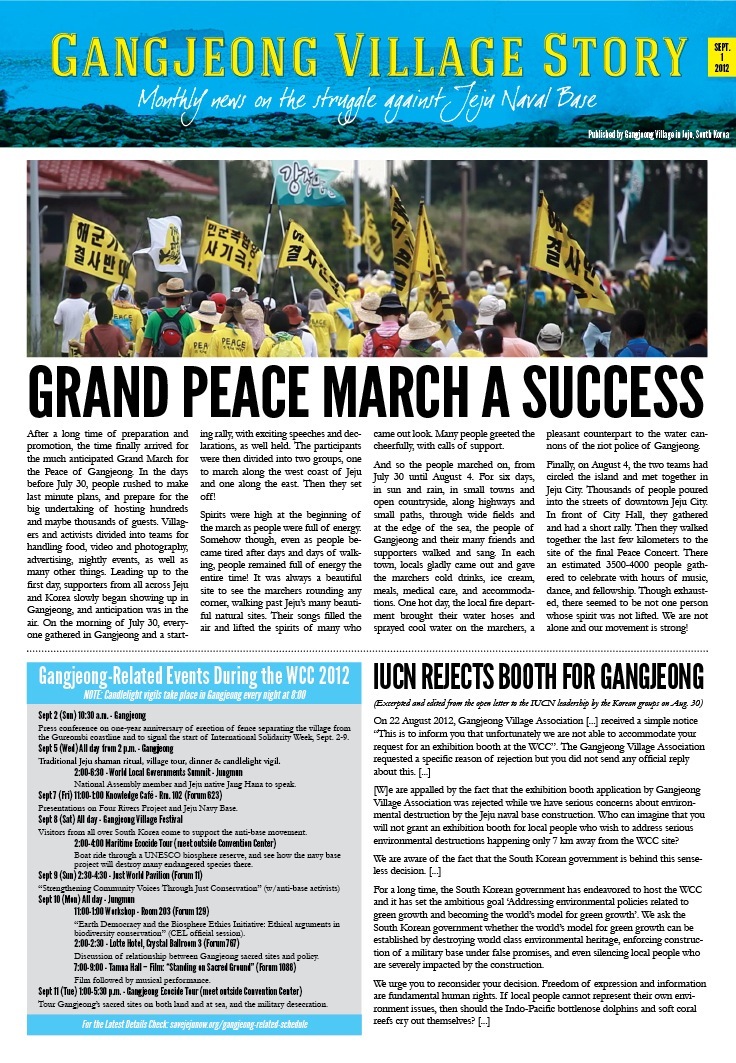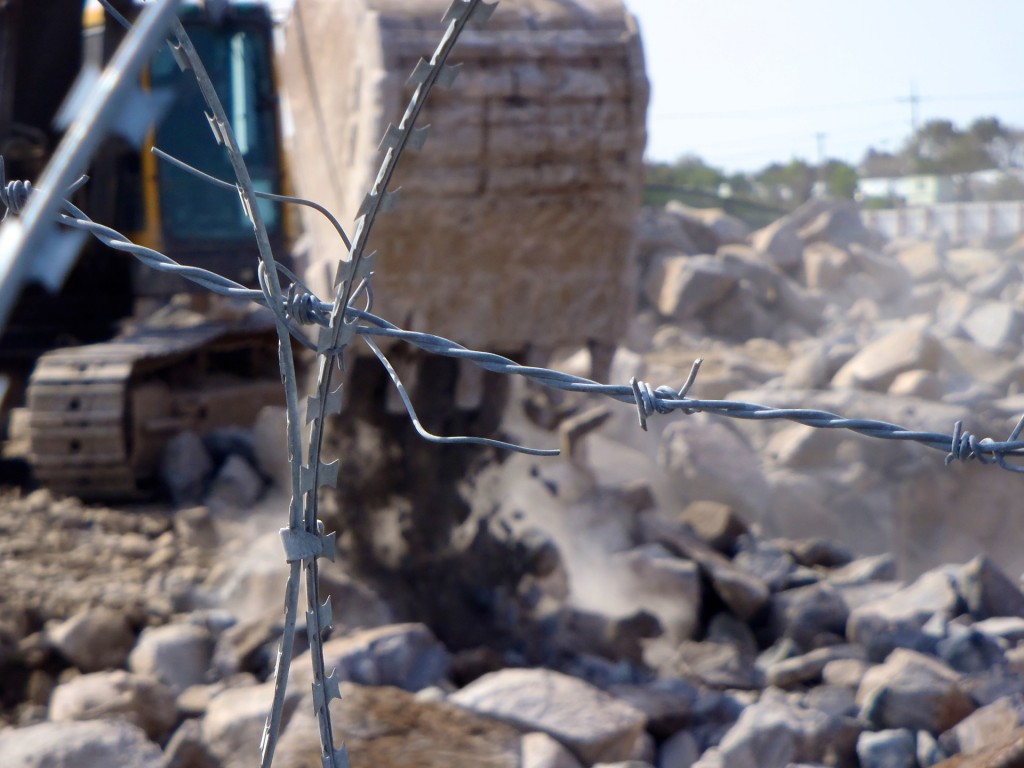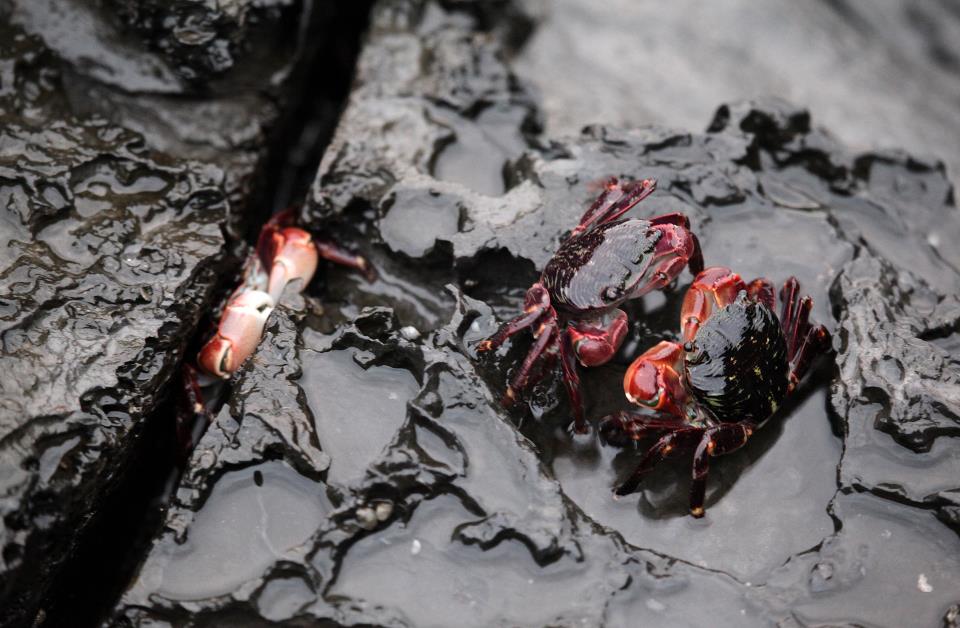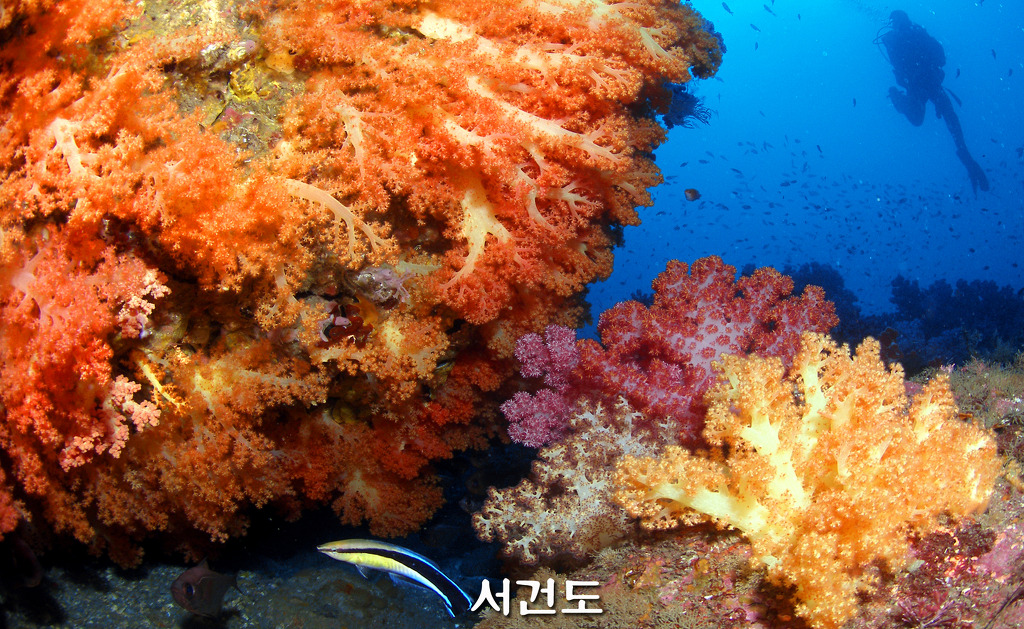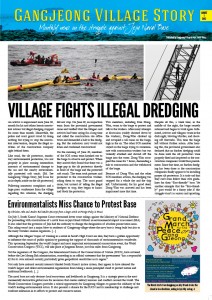Thousands join Grand Peace March and Peace Concert, IUCN Rejects Gangjeong Booth, Typhoon Bolaven Damages the Construction Site, Interviews with Mayor Kang & Women’s Committee Chair Jeong, Articles from Prison by Dr. Song and Kim Dong-Won, and more!
Save Jeju Now
No War Base on the Island of Peace
Category: Featured
-
Join Robert Redford in petitioning the IUCN to save Jeju
Pristine Jeju Island, home to one of the world’s largest soft coral reefs, is under threat from plans to build a naval base. Local protesters have been beaten by police, but now the world’s leading environmental organisation, the IUCN, is holding its annual summit there and could turn the tide by speaking out against the destruction.
If the IUCN was to change its position and condemn the plans, it would fundamentally weaken the government’s position. Let’s seize the opportunity of their summit, to call on IUCN Director-General Julia Marton-Lefevre to support the campaign to Save Jeju. We only have days left — the meeting starts on September 6th. Sign the petition on the right and the Mayor of Gangjeong village will deliver it to the IUCN Director General.
Click here to sign the petition and read a letter of support from Robert Redford
-
IUCN blocks anti-naval base Jeju Villagers from participation
IUCN leadership refuses to criticize Korea’s destructive naval base that is killing numerous endangered species, and destroying indigenous communities. This stance from IUCN defies its traditional mission, conserving nature and a “just world.”
The International Union for Conservation of Nature’s (IUCN) World Conservation Congress is the world’s largest environmental event. Held every four years, the 2012 World Conservation Congress (WCC) will be held from September 6-15 on Jeju Island, the “jewel” of South Korea. Over 7,000 leaders from government, the public sector, non-governmental organizations, business, UN agencies and social organizations will meet at this event.
Meeting just a few miles from Gangjeong village the IUCN has over and over again resisted requests from those living in the 450-year old fishing and farming community to help them protect their sacred nature and coastline from Navy base construction. A five-year non-violent campaign rages in the village and more than 500 people have been arrested for attempting to block the destruction of their way of life.
While continuing to proclaim its devotion to protecting Nature through democratic process, IUCN leadership has ignored or whitewashed projects that are assaulting these wonders, and undermining human rights and sustainable livelihoods.
The naval base project, meant to become homeport for Korean and U.S. “missile defense” warships 300 miles from China, is threatening one of the planet’s last great soft coral reefs, and other coastal treasures, killing numerous endangered species (including one on IUCN’s famous Red List), and destroying centuries-old sustainable communities.
The Gangjeong villagers are being met with daily police brutality. Such activities represent all that IUCN has traditionally opposed. Samsung corporation construction division is building the Navy base and has made significant financial contributions toward the WCC.
On August 22, an official letter arrived from IUCN leadership informing the Gangjeong villagers that their request to host a small Information Booth at the convention was denied. No explanation was offered.
“The Korean government announced that it would not permit any demonstrations or even picketing within two kilometers of the Convention. So, no speaker from the village or information table inside. No demonstrations outside. We are disappointed because we thought the IUCN stood for democratic participation,” commented Sung-Hee Choi, a Gangjeong resident and member of the International Organizing Committee.
Gangjeong villagers continue to press for a chance to address the IUCN and for a public display booth at the event. Efforts have been made to contact most of the thousands of IUCN delegates coming to the event and several have volunteered to introduce resolutions opposing the Navy base. Villagers intend to invite IUCN members to visit Gangjeong and see the environmental devastation for themselves.
Concerned citizens around the world are being encouraged to send messages to IUCN demanding fair treatment for Gangjeong villagers. Messages can be directed to: jml@iucn.org, president@iucn.org, congressforum@iucn.org; congress@iucn.org;
EMERGENCY ACTION TO SAVE JEJU ISLAND
Organizing Committee & International Support Group includes:
Christine Ahn
Global Fund for Women; Korea Policy Institute
Imok Cha, M.D.
Jerry Mander
Foundation for Deep Ecology; International Forum on Globalization
Koohan Paik
Kauai Alliance for Peace and Social Justice
Maude Barlow
Food and Water Watch, Council of Canadians (Canada)
John Cavanagh
Institute for Policy Studies (U.S.)
Vandana Shiva, Ph.D.
Navdanya Research Organization for Science, Technology and Ecology (India)
Walden Bello
Member, House of Representatives (Philippines)
David Suzuki
The David Suzuki Foundation (Canada)
Robert Redford
Actor, founder of Sundance Institute (U.S.)
Gloria Steinem
Author, Women’s Media Center (U.S.)
Noam Chomsky
Massachusetts Institute of Technology (U.S.)
Raj Patel
Institute for Food and Development Policy/Food First (U.S.)
Buffy Sainte-Marie, Ph.D.
Educator, Singer-Songwriter (U.S.)
Angie Zelter
Trident Ploughshares, (UK)
Matt Rothschild
Editor, The Progressive magazine (U.S.)
Susan George, Ph.D.
Transnational Institute (The Netherlands)
Galina Angarova
Pacific Environment (Russia)
Lagi Toribau
Greenpeace-East Asia
Victoria Tauli-Corpuz
Tebtebba Indigenous Peoples’ International Centre for Policy Research and Education (Philippines)
Lisa Linda Natividad
Guahan Coalition for Peace and Justice (Guam)
Eugeni Capella Roca
Grup d’Estudi I Protecció d’Ecosostemes de Catalunya (Spain)
Sara Larrain
Sustainable Chile Project (Chile)
Korean Federation for Environmental Movement and Citizen Institute for Environmental Studies (South Korea)
-
Support an INDEPENDENT Environmental Impact Assessment (EIA) to combat the Navy’s Lies
The Global Campaign to Save Jeju Island is collaborating with Greenpeace International, Endangered Species International, and the Marine and Environmental Research Institute to conduct an independent EIA that can challenge one conducted by the South Korean Navy.
Your donation will help us put environmental scientists to work! They will conduct site visits to areas where the three endangered species (frog, crab and shrimp) were relocated and an underwater survey of Jeju soft coral habitat near the naval base construction site.
Please help us convene a scientific team to conduct this independent EIA! Your grassroots support will help villagers fight the base construction with concrete, scientific evidence that can challenge the Navy’s assessment. Your support will also go towards providing other emergency needs of the villagers in their struggle to stop this naval base.
Donate Now
-
Environmentalists Miss Chance to Protest Base
On July 5, South Korea’s Supreme Court overturned lower court rulings against the Ministry of National Defense for proceeding with construction of a naval base on Jeju Island without an environmental impact assessment (EIA). It also ruled that the governor of Jeju had the authority to change the designation of absolute preservation areas. This ruling wasn’t just a major blow to residents of Gangjeong village where the navy base is being built but also to the many voiceless marine organisms. As you read this, massive caissons the size of four-story buildings are about to drop on soft coral reefs, forever destroying local marine ecosystems home to several endangered species.
Although the villagers’ hopes of winning in a retrial in Seoul’s High Court are slim, they have a golden opportunity to influence the court of public opinion by garnering the support of thousands of environmentalists worldwide. This upcoming September the world’s largest and most important environmental conservation event, the World Conservation Congress (WCC), will take place at Jungmun Resort, just four miles from Gangjeong.
-
